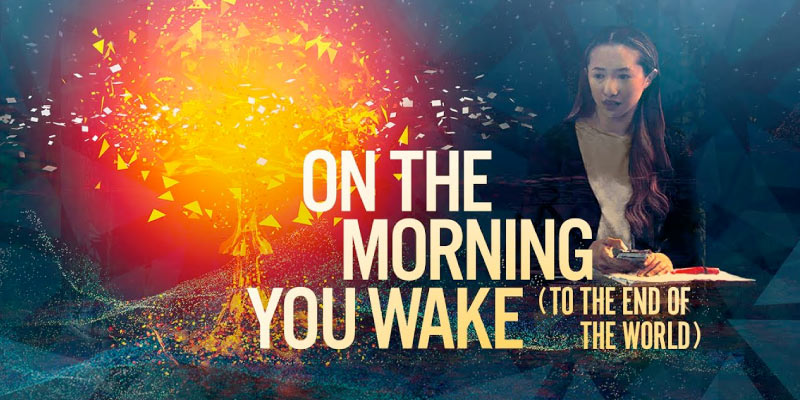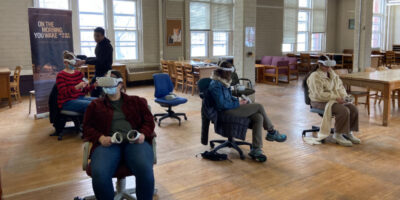
On March 9 and 10, 2023, the Graduate Associate Organizing Committee at the Center for Culture, History, and Environment (CHE) was proud to organize a two-day screening of the virtual reality documentary On the Morning You Wake (To the End of the World), an event cosponsored by CHE and the Associated Students of Madison and open to both current UW–Madison students and faculty as well as members of the greater Madison community.
On the Morning You Wake (To the End of the World) recounts the events of January 13, 2018, when Hawaii’s Emergency Management Agency sent a statewide warning about an imminent ballistic missile attack, a warning that turned out, ultimately, to be a false alarm.
Developed by creative teams at Atlas V and Archer’s Mark, organized by the nonprofit organization Games for Change, and featuring the spoken-word poetry of activist, artist, and professor of Native Hawaiian politics Dr. Jamaica Heolimeleikalani Osorio, On the Morning You Wake immerses the viewer in the experiential resonances of January 13 when over a million Hawaiians were forced to reckon with the existential threat posed by the destructive power of nuclear weapons. Framed by the pathos and power of Dr. Osorio’s poetry and grounded by moving eyewitness accounts detailing the events of January 13, On the Morning You Wake seeks to humanize and make immediate the vast, existential issue of global nuclear security, while updating and making relevant to a contemporary audience a threat many people mistake for a relic from the Cold War era.
 “It was so moving,” recalled one attendee. “What an amazing experience. I’ve been talking about it nonstop.”
“It was so moving,” recalled one attendee. “What an amazing experience. I’ve been talking about it nonstop.”
Attuned to CHE’s commitment to engaging in the continual practice of examining and addressing systemic and interpersonal forms of discrimination and injustice within environmental humanities and social science scholarship, On the Morning You Wake challenged participants to bear witness to the singular event of the false alert on January 13 while accounting for the expansive terrain of Hawaiian society’s encounters with colonialism across time and space, including the colonialism that informs modern nuclear ideologies. While the false missile alert lasted only 38 minutes from beginning to end, the virtual reality documentary embedded within this small window a long-term look at the mechanisms and impacts of generations of subjugation by colonial technologies, philosophies, and experiences, illuminating the connections between historical perspectives of Hawaii as an imperial theater and nuclear weapons policies in the current day.
After the experience, another attendee noted, “It’s difficult to do justice to the experience in virtual reality. Everything was visceral, immediate, and so impactful.” Following the screening, many participants praised the virtual reality component of the documentary, describing the ways in which VR lay emphasis on the ways dynamically embodied actions had meaning and agency, and the powerful sense of presence that arose from the same. The events of January 13 were affectively encountered, and therefore viscerally experienced, along multiple sensory registers thanks to the immersion allowed by the virtual reality interface.
The two-day screening concluded with a virtual discussion and debrief led by Lovely Umayam, a writer and a nuclear nonproliferation expert. As the founder of the Bombshelltoe Policy and Arts Collective, a creative organization pushing for an active exploration of arts, culture and history to promote nuclear nonproliferation, arms control and disarmament, Lovely talked about the role of art as a panacea for trauma and the capacity of creative work to bring governments, technologists, and civil society together to discuss how to secure nuclear materials around the world.